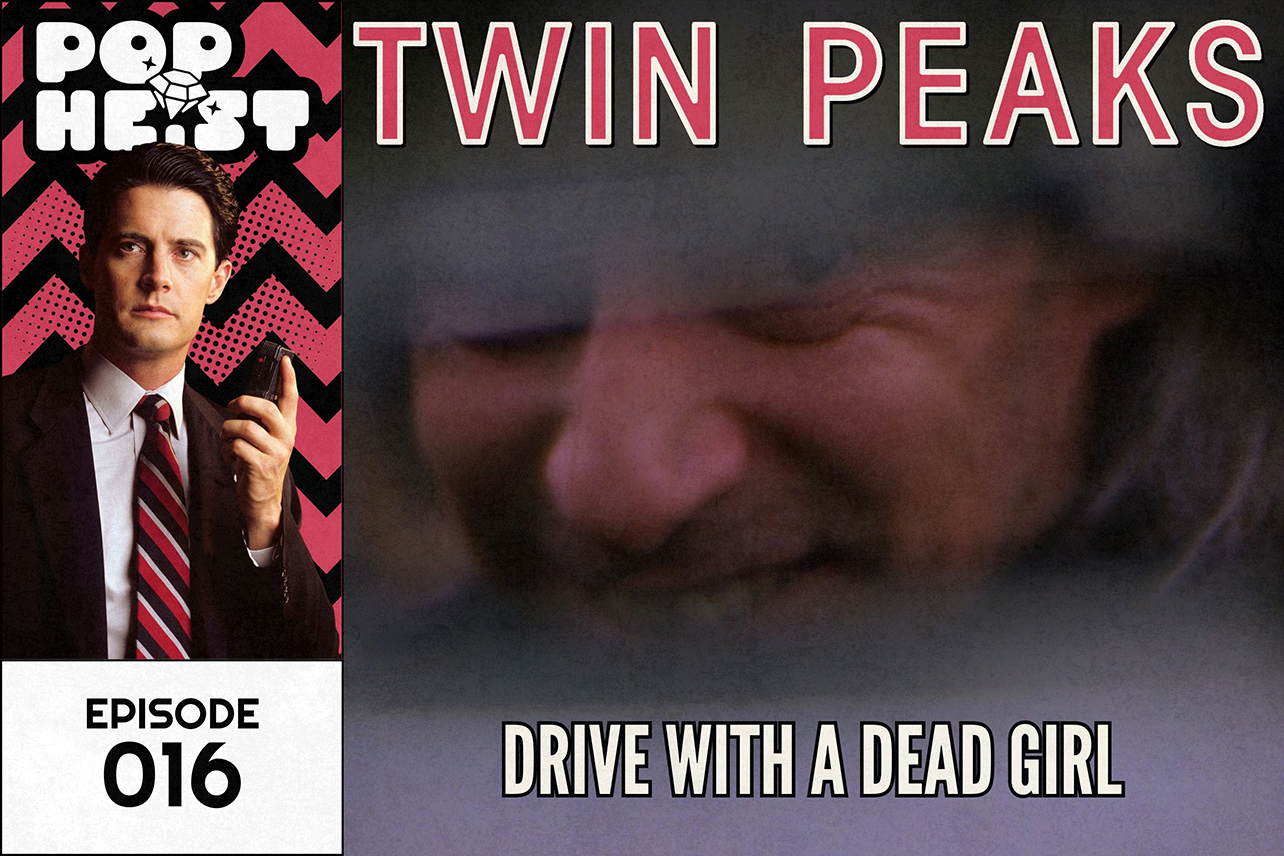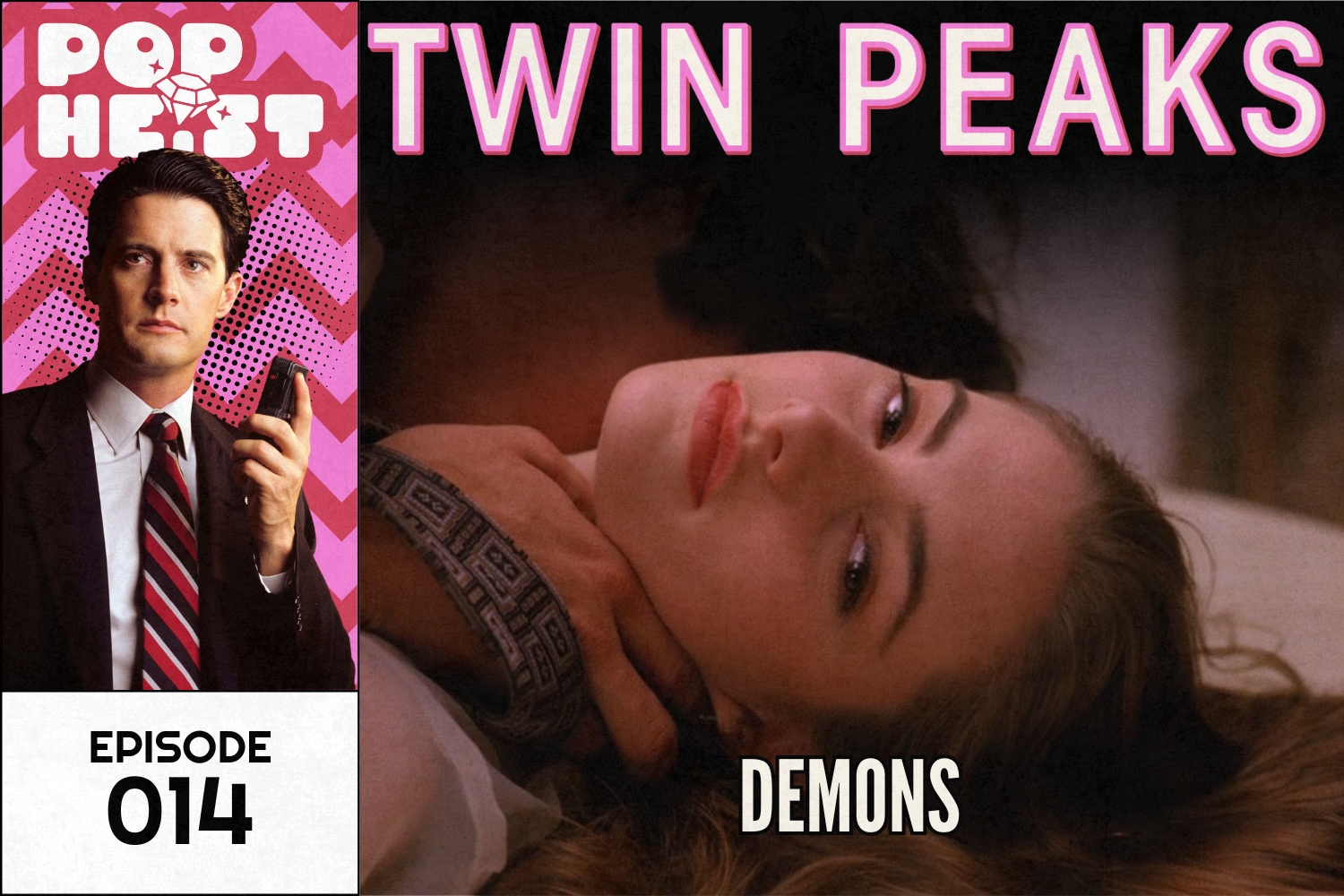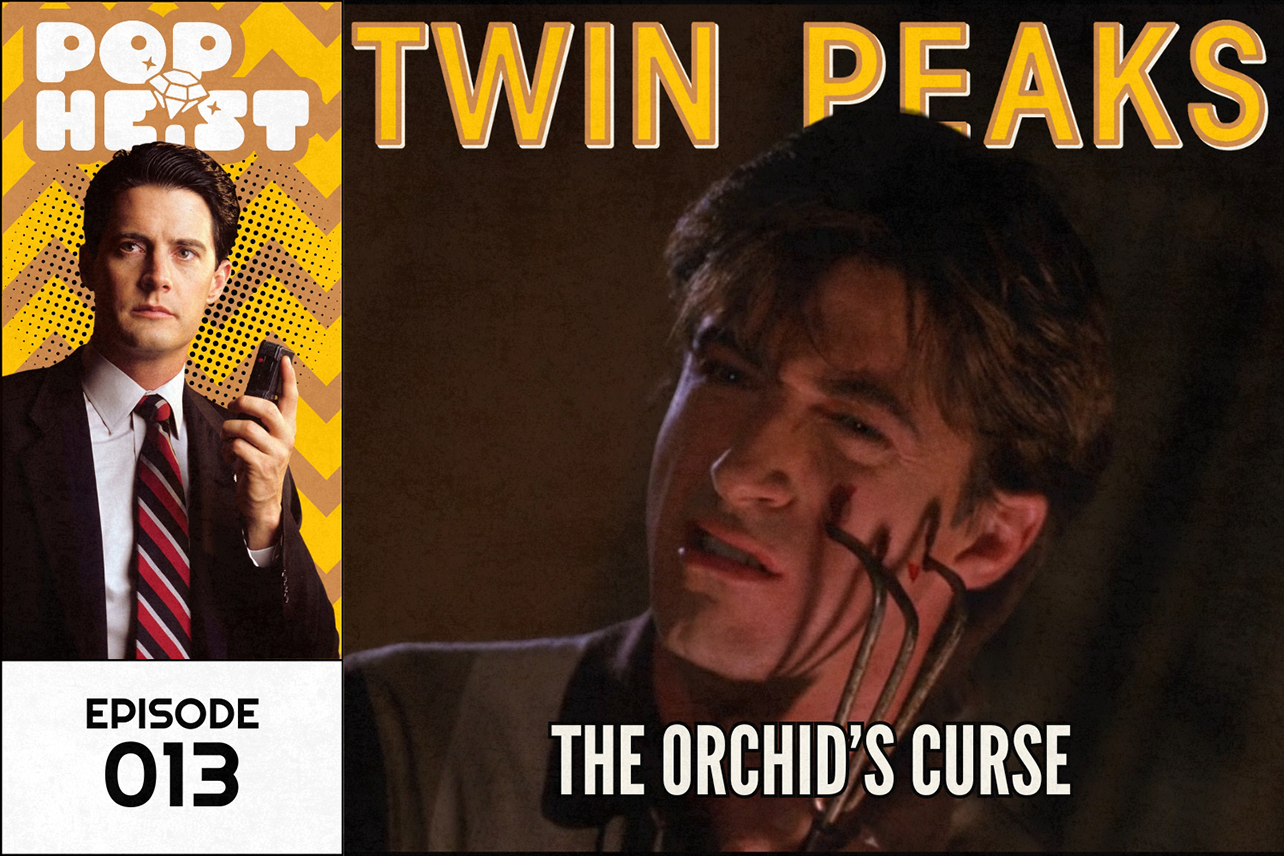In PRESTIGE PREHISTORY, Pop Heist critic Sean T. Collins takes a look at classic TV shows that paved the way for the New Golden Age of Television — challenging, self-contained series from writers and filmmakers determined to push the medium forward by telling stories their own way.
The Prisoner Episode 17 (airdate order) / Episode 17 (AVC order)*
"Fall Out"
Original Airdate: Feb. 1, 1968
Writer: Patrick McGoohan
Director: Patrick McGoohan
Cast: Patrick McGoohan, Kenneth Griffith, Leo McKern, Alexis Kanner, Angelo Muscat, Peter Swanwick
As a member of the Bureau, I spend most of my time seeking simple answers to difficult questions. In the pursuit of Laura's killer, I have employed Bureau guidelines, deductive techniques, Tibetan method, instinct, and luck. But now I find myself in need of something new, which for lack of a better word we shall call ''magic.'"—FBI Special Agent Dale Cooper, Twin Peaks
—
In the standard opening sequence of The Prisoner, the voice of the new Number Two tells Number Six that he and the masters of the Village want "information ... information … information." Some Number Twos deliver the latter two iterations of the word as if they're a phrase: "In formation…in formation." They want him to line up and march, like a good soldier.
The final episode of The Prisoner in every possible running order, "Fall Out" is named after a phrase with several meanings depending on whether it's one word or two. "Fallout" means the often unfortunate ramifications of an action or event; more specifically, it also means the radioactive debris that rains down on the area surrounding a nuclear explosion. People "fall out" when they have a relationship-ending argument or disagreement. Objects "fall out" when they drop from a place they'd been secured.
In a way, all of those meanings apply to this episode, but none more so than this: Just as soldiers "fall in" when they get in line, they "fall out" when they break formation.
Far out even by Prisoner standards — far out even by "Once Upon a Time" standards, which was itself far out even by Prisoner standards — "Fall Out" is one of the most confrontational series finales ever aired. It's a "Did you people think I was fucking around? Do you know what kind of show you're dealing with here?" moment on par with the trial of the Seinfeld Four, Tony Soprano playing Journey at the diner, and the Lynchian un-resolutions of the two (!) Twin Peaks series finales. (The first one was so unresolved that the 25-year gap until Season 3 somehow felt logical — like, of course it would take everyone that long to recover from what happened at the end of Season 2.) It's a finale that feels designed to be divisive.
It's set in a strange, cavernous chamber deep beneath the village, where a President in a powdered wig (played by a former Number 2, Kenneth Griffith, who I'm going to go ahead and assume is reprising his role from "The Girl Who Was Death" as I basically always do in these cases) oversees an Assembly of people in grotesque, bisected black-and-white masks and white monk's robes. Each of the Assembly's delegates represents massive and often diametrically opposite sociopolitical demographics ("Youngsters," "Old Folk," "Pacifists," "Nationalists") or concepts both broad ("Labour," "Entertainment," "Security") and specific ("Therapy," "Committee," "Identification"). They clap, cheer, chant, and jeer in eerie, artificial unison, often cutting off on a dime.
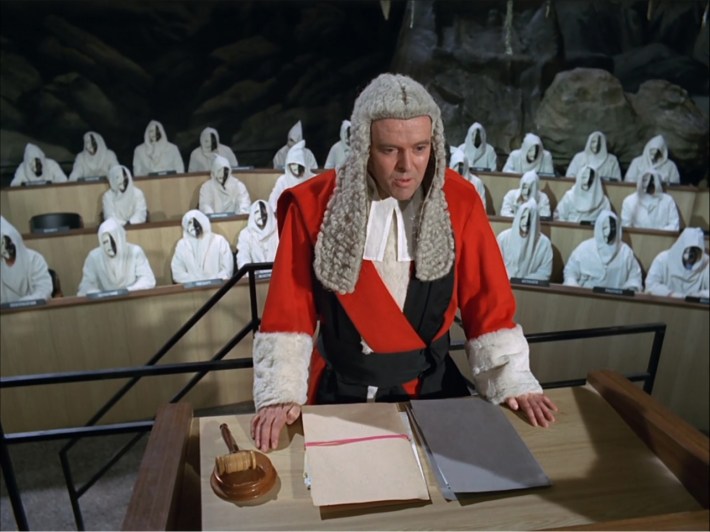
The President is presiding over the trial of three rebels against the Village's system, all of whom are familiar. The first is Number 48 (Alexis Kanner, the breakout star of "Living in Harmony"), somehow alive and well and still wearing a top hat. The "somehow" is a bit more apparent when you see who's second to stand accused: Number Two (Leo McKern), the same man who died at the end of the Degree Absolute ordeal in the previous episode. Before our very eyes we see the Village's scientists resurrect him from the (granted, only very recently) dead; presumably they could also do the same for the Kid.
I should note here that the strange young man's number has changed between appearances, from Number 8 in the Western-themed "Living in Harmony" to Number 48 here. This has led some fans and scholars to assert the two characters are meant to be two different people. I don't think this holds water, for a few reasons. First, we've seen the lower numbers get reused frequently, and not just by the constantly rotating Number Twos: Number 12s who were clearly different people played important roles in "The Schizoid Man" (as Six's double) and "The General" (as a fellow rebel). Dying and getting resurrected would naturally take you out of commission long enough for them to want to reassign that plum Number 8 of yours.
Which leads me to the second, more important point: Another dead character is brought back to life in this very episode! You're not going to let something as trivial as death, let alone a different number, stop you from observing what's plain as day on the screen: that this mad, magnetic man and the similarly crazed character from "Living in Harmony" are one and the same, right down to their choice in haberdashery? But the reappearance of the Kid and the resurrection of McKern's Number Two — complete with a makeover that leads him to proclaim "I feel a new man!", in actuality done to accommodate McKern's change in hairstyle in the time between when the two episodes were filmed — are challenging to accept if you're a stickler for realism.
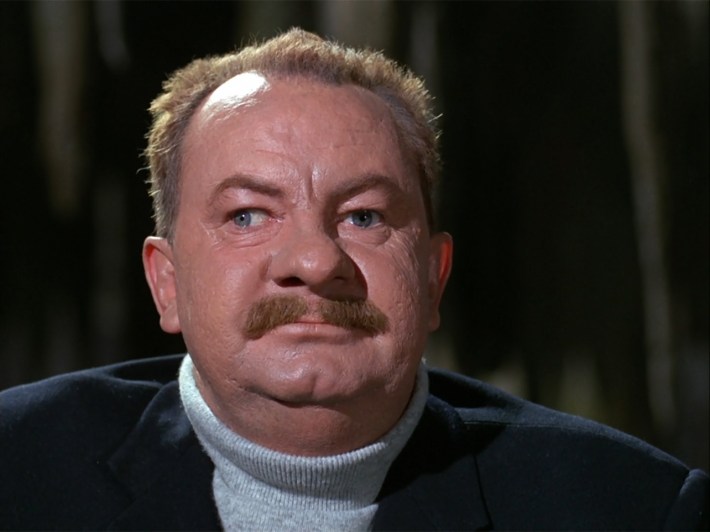
Their behavior makes it no easier. McKern's resonant laughter becomes a constant roar of cackling; Kanner's manic performance centers on the ceaseless — and I mean it never freaking ends — singing of the light-hearted spiritual "Dem Bones." The latter is often accompanied by repetitive snippets of a recording of the song by the Four Lads, adding to the tumult. (A very different four lads will come up momentarily.)
The President's dialogue is almost entirely flowery, fiery proclamations. His back and forth with 48, however, is rapid-fire absurdist Beat poetry, in which the younger man repeatedly asserts that his "bones" — you know, the one he's been singing about and singing about and singing about — were all given to him by his "Dad," the President himself. This, at least, is not to be taken literally. Forty-eight, the President informs us, is on trial for having fallen prey to the unfocused, purposeless rebellion of youth — a necessary phase, perhaps, but one that must be grown out of and never allowed to threaten the social order with dress, speech, conduct, and thought inimical to societal unity. In his own strange way, Number 48 is saying that whatever he is, the older generation made him.
Though written with the protest movements of the 1960s in mind, every single thing the President says about youthful nonconformity sounds like the President of the United states and/or any given prestigious university talking about anti-genocide campus activists today. Same as it ever was. But beyond the deeply uncomfortable resonance with our present moment — this is the most insane and sinister dystopian dialogue in the show, and it's nothing you can't hear from the mouth of the most powerful man in the world on a daily basis — it all says fascinating things about Patrick McGoohan and his moment as well.
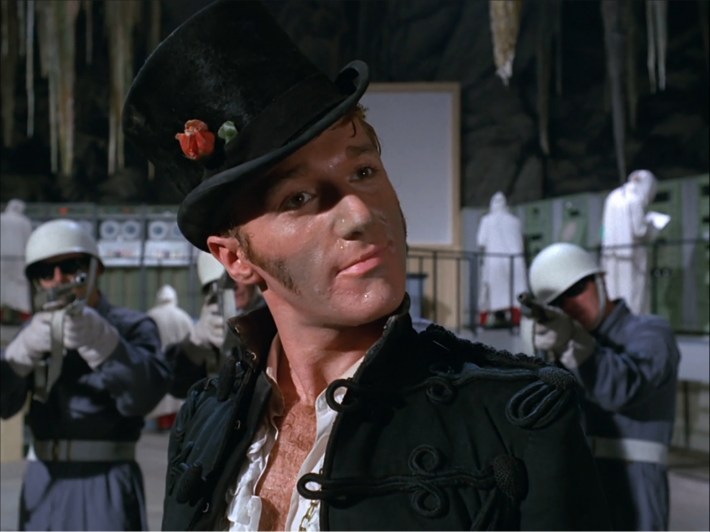
Like its immediate predecessor "Once Upon a Time," a recap montage of which begins this episode in lieu of the traditional opening, "Fall Out" is a full-on McGoohan auteurist moment. Its strange symbolic trial of the three rebels feels like a man in conversation with himself. (More on that later, that's for sure!) So what's fascinating about Number 48 here is how he demonstrates McGoohan's simultaneous repulsion by and attraction to the youth counterculture. On the former end, besides being unbelievably annoying and very clearly insane, 48 is also a stalker, a killer, and arguably a sex criminal, if he is indeed Number 8/The Kid from "Living in Harmony," and I really see no reason to believe he isn't. (Alexis Kanner even gets his name in a little box again in the opening credits to set him apart. Why would they do that if they didn't want you to connect the two performances?)
But at the same time, listen to what the President says about the Kid and tell me McGoohan doesn't find this to be a load of contemptible authoritarianism:
Youth, with its enthusiasms, which rebels against any accepted norm because it must — and we sympathize! It may wear flowers in its hair, bells on its toes, but when the common good is threatened, when the function of society is endangered, such revolts must cease. They are non-productive and must be abolished!
[…]
The prisoner is charged with the most serious breach of social etiquette; total defiance of the elementary laws which sustain our community; questioning the decisions of those we voted to govern us; unhealthy aspects of speech and dress not in accordance with general practice; the refusal to observe, wear, or respond to his number!
Given the role Number 48 plays in the climax, I think we know where our sympathies are meant to lie.
The same applies with Number Two, but from the opposite direction. Through his own testimony, we learn that Two was once like Six (who, having triumphed in Degree Absolute, is given back his all-black civilian clothes and no longer referred to by that number or any other).
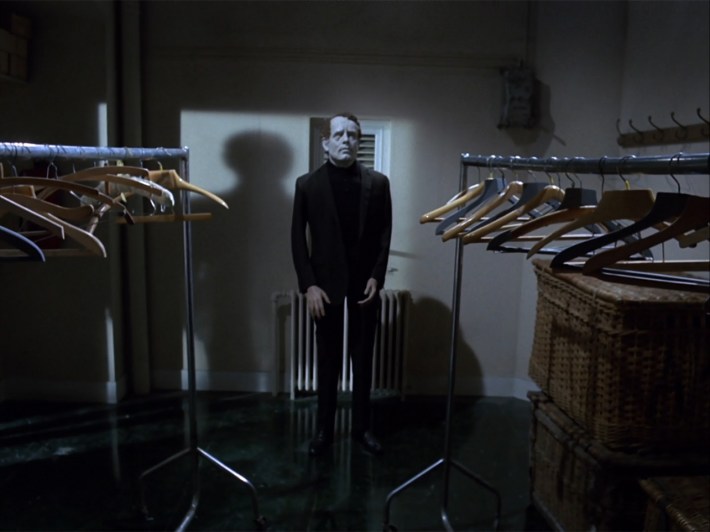
Once a high-level intelligence operative who worked people at the highest levels of power in countries around the world, people he was capable of overthrowing or crowning with a word, he was abducted and brought to the Village as a prisoner. "What is deplorable," he tells the Assembly, "is that I resisted for so short a time." Now we know why he feels "a new man": The resurrection process broke his conditioning, to the point where he's willing to challenge even Number One himself.
Himself, or itself? At this point, we still have not met Number One, as promised by the Supervisor last episode. What we've met is a large HAL-9000-like green eye orb in a large metal column labeled with a giant red numeral "1." Through this machine, Number One observes the proceedings and communicates with the President via a series of beeps only he can understand. I'm suddenly possessed with the eerie certainty that every time we heard a Number Two talk to Number One on the phone, the beeps were what they were responding to all along.
"Look me in the eye," says Number Two to the Number One orb — pointed dialogue given his very noticeable mismatched eyes. "Whoever you are. Whatever you are."
"You'll die!" yells the President.
"Again?" Two scoffs. "Then I'll die with my own mind. You'll hypnotize me no longer!" The resultant staredown, coupled with Number Two spitting right in its "face," causes the thing to short-circuit.
So we learn the nature of this prisoner's crime against authority: "A successful, secure member of the establishment, turning upon and biting the hand that feeds him," the President proclaims. This is just as intolerable, more so perhaps, to the establishment as rebellion from the ground up. You see echoes of this in the way the conservatives and fascists of yesteryear talked about FDR as a class traitor, or the way Democratic leadership and New York Times writers talk about Zohran Mamdani, a man from the same highly educated class as them who shames them by choosing a different path.
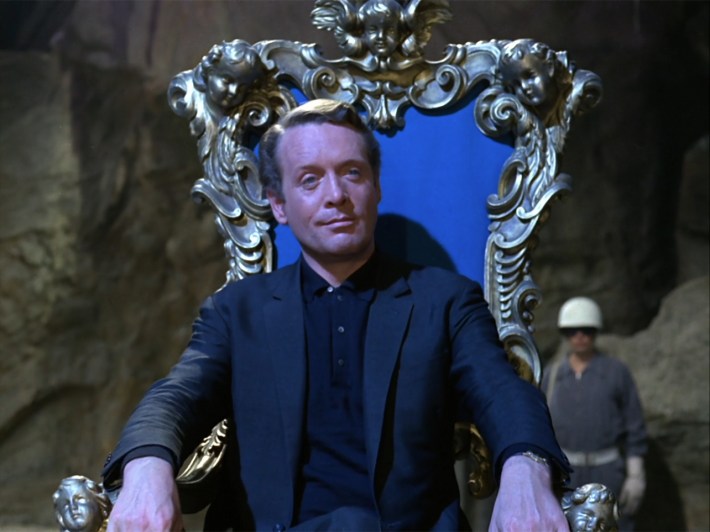
But we were promised three rebels, three trials, and that's what we get. The third man, of course, is the prisoner formerly known as Number Six. He's escorted into the bowels of the Village by the Butler, who accompanies him to the final destination, and the Supervisor, who does not. He makes his way down a cave tunnel lined with jukeboxes playing, get this, the Beatles' "All You Need Is Love" — a top five TV needledrop of all time, easily — to a massive, ancient metal door that the Butler opens with an old fashioned key. Behind this is a door reading "WELL COME." (Not "welcome," just as the episode is titled "Fall Out" rather than "Fallout.")
Beyond that is the Assembly room, lined with machine-gun toting white-helmeted soldiers, guarded by a rotating see-saw machine-gun emplacement not unlike the similar setup used by camera people in the Observation Room, and presided over by the red-robed, powdered-wigged President. There's also a blue throne where the Prisoner is beckoned to sit, attended to by the Butler, now his servant rather than the resurrected Number Two's or even the President's.
The Prisoner isn't just the third and final man to stand accused — he's also the guest of honor. The Village has decided that his indomitable will to remain an individual, his triumph over Degree Absolute and every other test and torment to which they've subjected him, marks him as a true revolutionary, a "man of steel" (like both Superman and Stalin) who could be their ultimate leader.
Or, if he prefers, he can leave. "You are free to go," the President tells him.
"Free to go," the Prisoner repeats, echoing the similarly perseverative dialogue from the sham-democracy episode "Free for All." (There are a lot of callbacks in this episode.)
But whatever he decides, there's one last thing to do. At long last, he can meet Number One.
He's lowered yet another level, where Two and 48 are held in tubular prison chambers, laughing and singing all the while. He makes his way into a control room, where he approaches a white-robed person whom he watches turn to face him in a monitor above a control panel before it actually happens in real life. (God, that's creepy.)
The white-robed figure gives the Prisoner a sphere of glass, a crystal ball. Their hands hold it in the foreground while the familiar "I will not be pushed, filed, stamped, indexed" speech airs on the screen in the background. Then the figure reveals the large number 1 painted on his robe, and the ball drops, literally.
The Prisoner yanks off the grotesque black-and-white mask to reveal an even more unpleasant monkey mask, which flaps its rubbery, wet-looking mouth. Someone's making a monkey out of him.
The Prisoner pulls off that mask too, and we meet Number One: a grinning, gibbering, shrieking, wild-eyed madman who looks just like the Prisoner himself. We have met the enemy, and he is us.
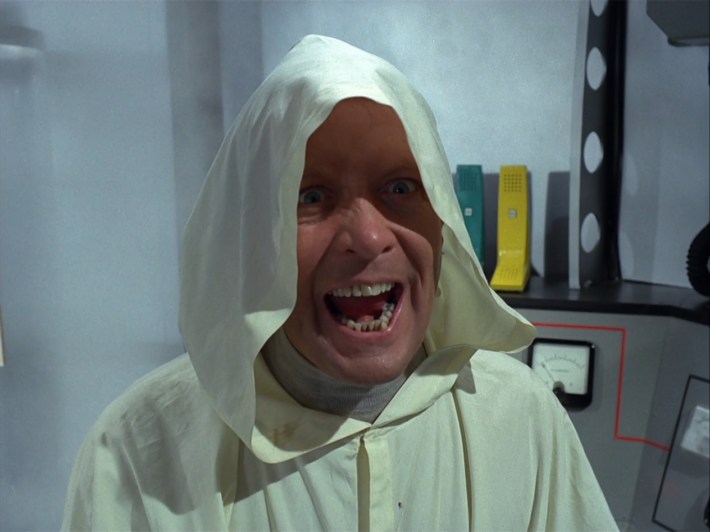
Screaming crazily right back at his tormenter of all these many months, the unmasking of whom can only possibly raise more questions than it answers, the Prisoner gives chase, only for the berserk doppelgänger that is Number One to escape.
Undeterred, the Prisoner enacts plan B. With the help of the Butler, he frees Number Two and Number 48. The four men burst into the assembly room with machine guns, opening fire and slaughtering the Assembly and guards in a deafening gun battle set, once again and even more incongruously than before, to "All You Need Is Love." (Period pop music is heard throughout the episode, though that's by far the most recognizable song; again, there's that push-pull of attraction and repulsion towards youth culture.) The sight of the Butler going full Rambo is magnificent after all this time of watching the poor man get thanklessly bossed around by these lunatics for 17 episodes. If there's a glass-half-full read of this bleak show, it's that at least this guy wasn't in on it all along.
The President gives the order to evacuate. The Assembly chamber and the entire Village clear out. Two, 48, the Butler, and the Prisoner hop into the trailer in which that caged-in mobile home from "Once Upon a Time" was enclosed, and the Butler drives them free of the Village to safety. The launch sequence that the Prisoner initiated in Number One's control room during the chaos completes. The massive rocket containing the Village's nerve center blasts off through the ground — an echo of the ridiculous supervillain rocket scheme from the comical "The Girl Who Was Death." The Village, revealed in the opening credits to be the Welsh seaside locale of Portemeirion, is presumably destroyed. Rover resurfaces one last time and melts down, as Carmen Miranda's "I, Yi, Yi, Yi, (I Like You Very Much" plays on the soundtrack.
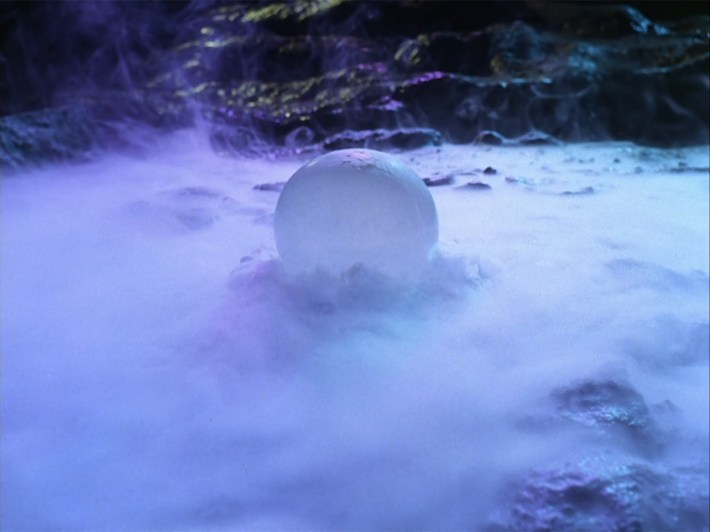
As the Butler drives the truck towards London, the route identified by familiar British road signage, the three prisoners dance and sing and have celebratory tea, much to the chagrin of a real "Pardon me, but do you have any Grey Poupon?" type who drives up alongside the open-sided truck bed.
Before they reach the city, Number 48 hops up to hitchhike. (Perhaps unsurprisingly given his top hat, he is unsuccessful.) Within London, a cop stops them, and they abandon their vehicle to go their separate ways, allowed to do so by the cop, who seems to figure they're more trouble than they're worth.
Number Two reveals himself to be a peer of the realm by entering Buckingham Palace. The Prisoner returns to his old home with the Butler. As the man who brought down the Village hops in his Lotus-7, the Butler enters the home. The door, which makes the same mechanical sound as doors in the Village do, closes automatically behind him. The number on the door is now "1."
During this sequence, credits label each character. Number 48 is Alexis Kanner. The Butler is Angelo Muscat. Number Two is Leo McKern. The fourth man, not shown when his credit appears, is billed simply as "Prisoner."

To the familiar rumble of thunder, the Prisoner drives his Lotus-7 down the same lonely road he does in the opening credits. A close-up reveals a Mona Lisa smile on his windswept face in a shot that lasts a few fleeting sequence before a hard cut to black ends the show.
But does it end the story?
I presented the whole final act of the episode, of the whole series really, as that litany of events and images because that's how it feels. After that bizarre trial, the ending comes as a series of slaps to the face. The shock of Number One's "identity," the cacophonous gun battle, the cockamamie action-hero behavior of the four leads, the sudden escape where such things once seemed impossible, the unprecedented (if crudely done) spectacle of the rocket launch, the Village's abandonment, Rover's destruction, the reveal that we've been in Britain this whole time, the return to London and to the Prisoner's car and house, the sudden superimposition of the actors' names on the characters except for Patrick McGoohan's, the elliptical möbius-strip ending: Any one of these things would be a wild break from the norm — again, even the non-normal "norm" of The Prisoner. All of them together — again, after the unprecedentedly surreal trial — is dizzying.
Too much to take, even? If you made that argument I wouldn't get in your face about it. As a sensory matter this is a tough episode to take, an experiment in what the Brian Jonestown Massacre once referred to as bravery, repetition, and noise. Some people hyperfocus on "Was Number Six really Number One?" but from cloning to surgery to drugs there are plenty of in-universe explanations for how that was pulled off. (Remember "The Schizoid Man," just for starters?)
This episode had other questions in mind. How far can we take the artificiality and abrasiveness of the dialogue, the editing, the music, the action, the performance styles, the science fiction, the political allegory, the dream-logic narrative? Now that we've gotten to the finish line, can we make you regret getting there?
Some of the things McGoohan does in service of these questions are genuinely irritating, and if the result is genuine irritation, that's on him. Of course he's aware of this. Some years later he'd give one of those "Love it or hate it, it got people talking, which means it was a success in my book" answers to one of those "Why do people so passionately dislike the end of this thing you loved making?" questions, and he may be the only artist in history whom I believe isn't saying this as a cynical dodge of responsibility for making something stupid or shitty.
When you watch The Prisoner in the order we did, you see the ebb and flow between the faux "reality" of the relatively straightforward sci-fi/spy adventure stuff, and the (sometimes literally) hallucinatory imagery and plotting of the more challenging or psychedelic episodes. "Fall Out" ends all that with as forceful a move in the direction of symbolism and aburdism as McGoohan could possibly have made. The result feels not just weird but mysterious, even arcane — an allegory that's nearly medieval-mystical in its tone, on the level of the Chymical Wedding of Christian Rosenkreutz. This is the kind of episode very stoned people turn into life-governing conspiracy theories.
But the final shot reveals that the heart of it is the same as it ever was. With his new address, his automatic door, the strange circumstance surrounding his departure, the nature of Number One, and his billing as "Prisoner" — to say nothing of his track record in the area of escapes back to England — we've got every reason to believe the Prisoner is not yet free. But nor is he broken. We last see him in his car, racing for an unknown destination. Does it matter if he gets there in the end as long as he's still driving?
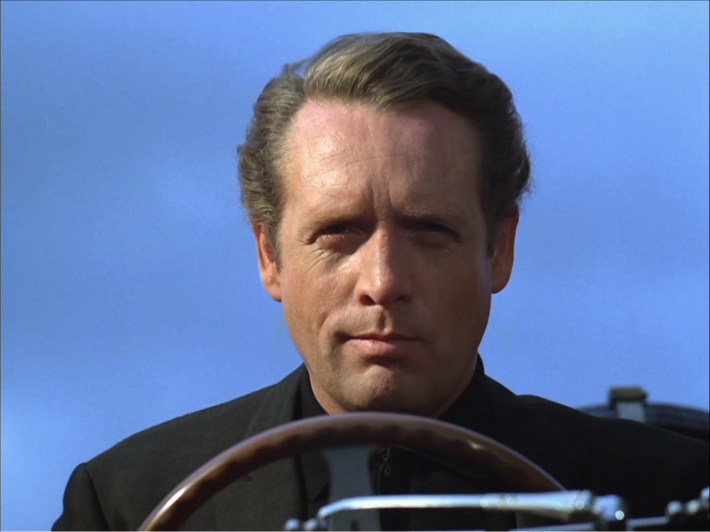
Despite everything the Village has thrown at him — including his nemesis, which may or may not be himself, but aren't we all our own prisoners in the end? — he will not make any deals with them. He's resigned. He will not be pushed, filed, stamped, indexed, briefed, debriefed, or numbered. His life is his own. They can take so much from him, they can take so much from all of us, but as long as we retain the conviction that we are human, our lives are our own. There is a limit to what else they can take away as long as we never allow them to take away that.
This recap was originally accessible to paid subscribers only, and future recaps in this series are available now for paid subscribers. If you haven't already, consider supporting worker-owned media by subscribing to Pop Heist. We are ad-free and operating outside the algorithm, so all dollars go directly to paying the staff members and writers who make articles like this one possible.

